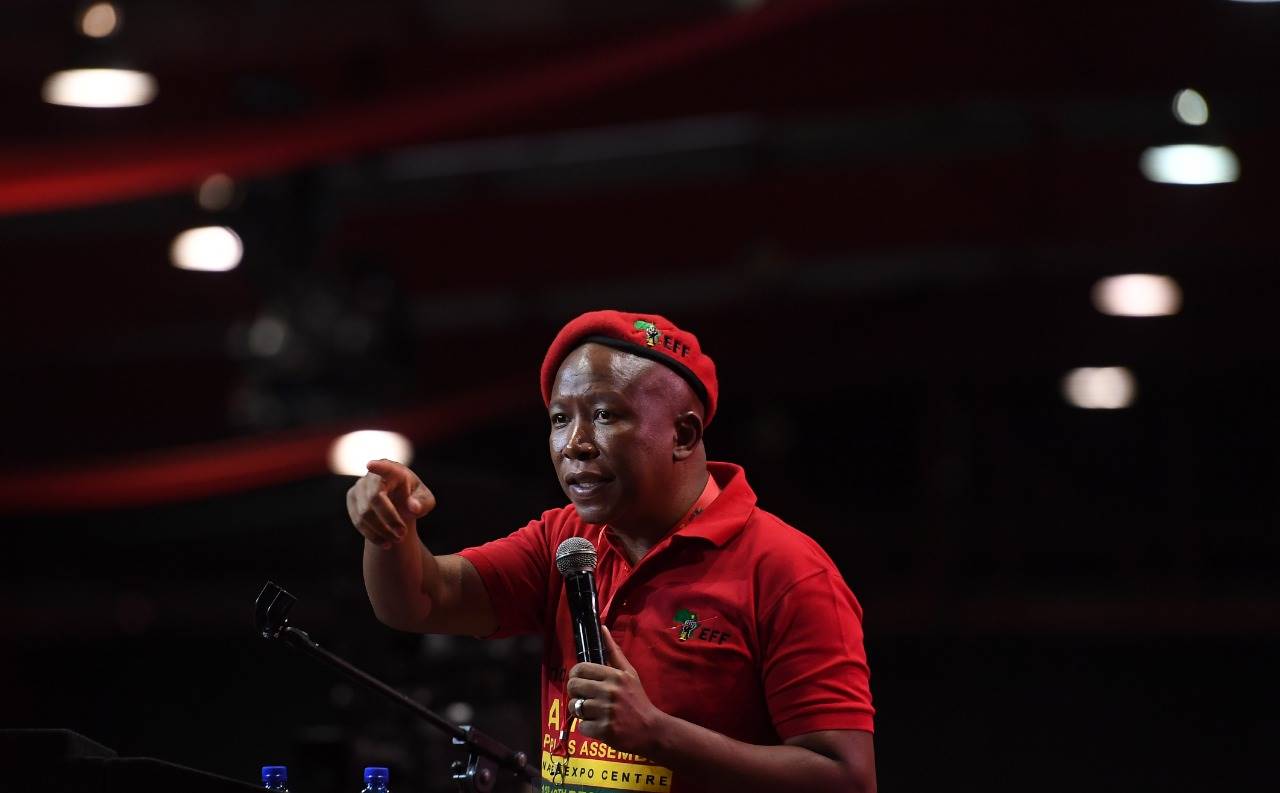


Julius Malema.
Photo: Felix Dlangamandla
- The EFF will challenge an SANDF report on the death of Collins Khoza that clears the soldiers who allegedly assaulted him.
- EFF leader Julius Malema is confident of a fair outcome in court.
- Malema was speaking at a Black Lives Matter protest outside the US embassy in Pretoria.
The EFF will challenge the outcomes of an investigation by the South African National Defence Force (SANDF) which cleared its members of wrongdoing in the death of Collins Khosa, Julius Malema said on Monday.
Malema, EFF leader, was speaking at a Black Lives Matter rally the party held at the US embassy in Pretoria to protest over the death of American George Floyd in Minneapolis on 25 May after a police officer knelt on his neck for several minutes.
Speaking to the media, Malema said the party was confident it would get a favourable judgment from the courts. He spoke to EFF supporters while Khosa’s wife, Nomsa Montsha, stood alongside him.
ALSO READ | Adriaan Basson | If all black lives matter to the ANC, what about Collins Khosa’s death?
He said the party moved quickly to the defence of the Khosa family after his death.
“The first thing we did was to send lawyers, that if they need legal representation we are there. That is why you see Ian Levitt Attorneys helping them with [advocate Tembeka] Ngcukaitobi. We briefed them and we moved beyond that. We buried Khosa because we knew the family will struggle because they are a poor family from Alexandra.”
Montsha also shared a few words, saying that she watched as soldiers and police brutally assaulted and killed her husband. She said:
I watched everything. I know what happened. I am happy to be here today and thank the EFF for the support that they give the Khosa family.
In March, days after the start of the national Covid-19 lockdown to stop the spread of the coronavirus, 40-year-old Khosa died at his home in Alexandra, Johannesburg.
According to court papers filed by his family, he was approached by SANDF members who asked about a vacant chair and half a glass of alcohol next to it. Khosa replied that he was allowed to drink at his home, but the soldiers allegedly did not take kindly to the comment.
They allegedly assaulted Khosa, poured beer over his head, held his hands behind his back while they choked and beat him, slammed him against a wall, and used the butt of a machine gun to hit him.
Once they had left, Khosa’s wife said she laid him on their bed and held his hand – but, not long after that, she noticed he had stopped moving.
When the ambulance arrived, he was already dead.
Board of inquiry
While the police were busy with a murder investigation, the SANDF also instituted a board of inquiry into Khosa’s death, chaired by Brigadier Viscount Ngcobo. Meanwhile, the court found in favour of Khosa’s family in a damning judgment against the SANDF and police.
Last week Tuesday, the SANDF’s legal adviser Elvis Hobyana filed an explanatory affidavit to the court to explain which steps it had taken since the judgment.
Attached to this was the findings of the board of inquiry, which stated that the soldiers accused of killing Khosa cannot be held liable for this death as there was no link between the injuries he sustained due to their actions and him dying.
It further stated that Khosa and his brother-in-law were “undermining the two female soldiers”, the force used to get the men to comply with the officers’ instructions was “pushing and clapping (sic)” and that Khosa was “conscious and healthy when the security forces left”, News24 reported earlier.
Malema said he was convinced that the judges will be on “our” side. He added:
It was brutality, it was abuse of power and we don’t associate with the bad elements among our army and the police. It should be acted upon because they give our men in uniform a bad name.
The EFF leader also spoke about his disapproval of government’s decision to open schools on Monday. He rubbished claims by Basic Education Minister Angie Motshekga that schools in the country were 95% ready to reopen.
“It will take us decades to fix the schools in South Africa. These schools were designed for black people and didn’t have much facilities. Prisons are much cleaner than schools. A lot of schools do not have basins in toilets and they use common taps,” he said.
“These schools are going to create serious problems for us. It will end in tears, the same as the mines, the same as big factories. They never practice social distancing, they never practice social distancing and issues of health. They are not safe at all.
“The owners of these factories don’t think that black people deserve to work in a healthy environment and they have not invested much in ensuring black lives are saved.”

